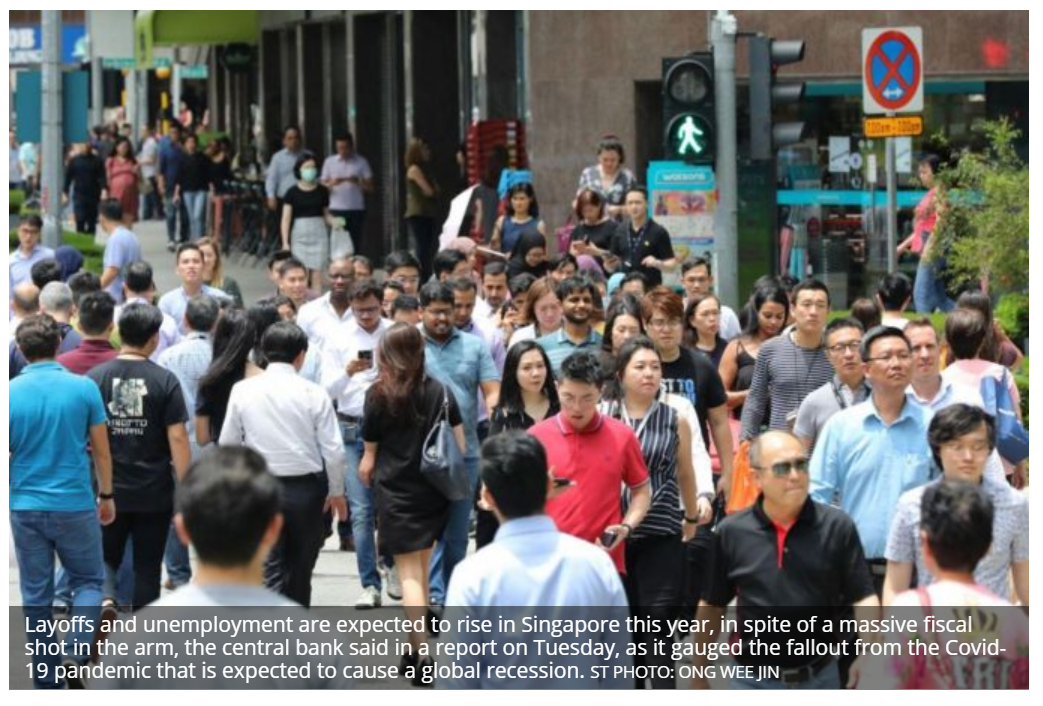Singapore: Jobs support cushions blow but layoffs, unemployment will still rise: MAS
LAYOFFS and unemployment are expected to rise in Singapore this year, in spite of a massive fiscal shot in the arm, the central bank said in a report on Tuesday, as it gauged the fallout from the Covid-19 pandemic that is expected to cause a global recession.
The government has unveiled policies such as the Jobs Support Scheme to subsidise local employees’ salaries – a move that researchers from the Monetary Authority of Singapore (MAS) dubbed “more sizeable, timely and efficacious” than measures during the severe acute respiratory syndrome (Sars) crisis of 2003 and the Global Financial Crisis in 2008.
Still, the MAS warned in its latest half-yearly report that retrenchments will rise, with retail trade, food and beverage and recreation services staff “most vulnerable to being laid off” – especially as overall and industry labour market conditions were already soft in end-2019.
That’s even though some of the spike in unemployment could ease as workers pull out of the labour force on the lack of employment opportunities, since people who are not working are counted as unemployed only if they are active job seekers.
But even before pink slips are handed out, wages are expected to take a hit – and soon.
Resident monthly wages may decline if the support is not enough to offset business losses, and workers’ hours and pay are both cut, the MAS Economic Policy Group warned.
These drops in wages “are likely to occur swiftly and sharply” in the transport and storage industry, where business activity has been hit by the measures taken to curb the spread of the novel coronavirus, according to the research group’s forecasts.
Other sectors tipped to suffer include financial services, where pay “is highly responsive to changes in business cycle conditions” and has a high variable component, and accommodation and food services, where the number of hours worked is on the decline.
The belief that unemployment jumps when companies are on the verge of going belly-up has spurred measures to keep businesses afloat, such as the Jobs Support Scheme.
Indeed, the MAS analysts found that the scheme will grant an effective annual wage subsidy of 14.9 per cent – larger than the impact of a three-point cut to employers’ Central Provident Fund contributions during Sars, with its effective annual subsidy of 2.3 per cent; or the 12 per cent cash grant on resident wages in 2008, which gave a 6.4 per cent subsidy.
With a higher level of government co-funding for harder-hit industry sectors, and a salary cap of S$4,600 that targets companies with more lower-wage workers, the Jobs Support Scheme was billed as “effective in providing more support to the most affected sectors”.
The subsidies are expected to deliver more support to accommodation and food services and transport and storage, compared with the resident wage bill in the rest of the economy.
The scheme’s payout schedule, which began in mid-April, is also expected to be similar to or more timely than its predecessors “in alleviating firms’ cash flow bottlenecks”, said the report.
The report suggested that the Jobs Support Scheme will help with demand and economic growth in Singapore, as it encourages firms to keep workers employed, and supports both personal incomes and household consumption spending.
Without the policy measures taken to reduce manpower costs, the resident unemployment rate would be higher by about 0.7 percentage point, according to the central bank.
Still, labour force growth this year is expected to be seen only in “a handful of industries such as construction, healthcare and public administration and education”, the MAS said, citing public infrastructure projects and the SGUnited Jobs push to add specific in-demand roles.
Source: https://www.businesstimes.com.sg/government-economy/jobs-support-cushions-blow-but-layoffs-unemployment-will-still-rise-mas


 English
English




